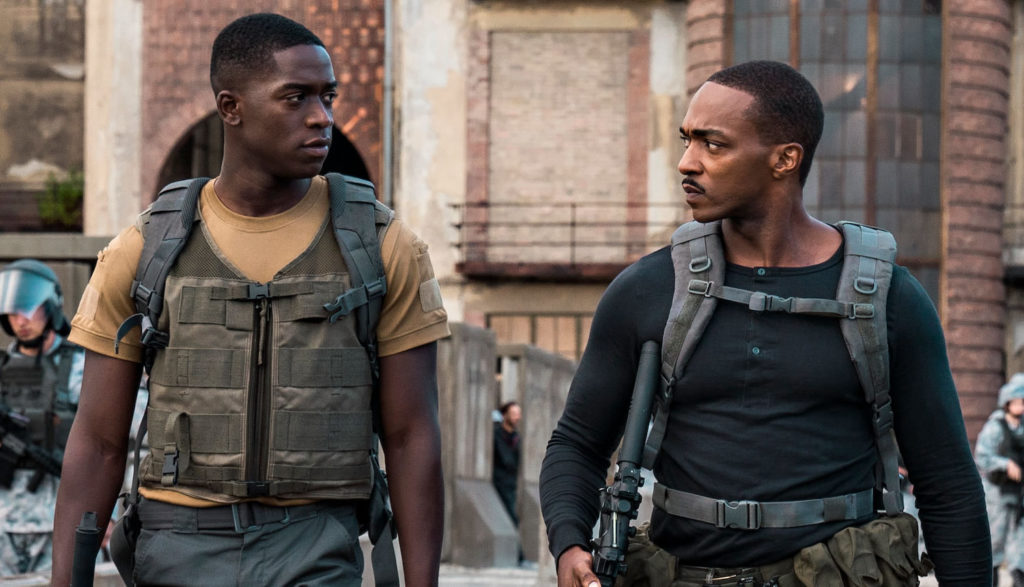
Civil war has erupted in Eastern Europe, and the United States military is right in the middle of it all. But that means something different for everyone.
For Lt. Thomas Harp, a drone pilot, the war is fought on his computer screen. Removed from the messy reality of the front lines, Harp makes calls void of emotion. It’s what he’s paid to do. One day, he takes it too far and chooses to disobey a direct order, saving the lives of 38 Marines while sacrificing the lives of two—a decision not all are pleased with. But to him, it was simple. Purely statistics.
But whether he was right or not is not the point. The point is that Harp has a problem connecting emotionally with the outcome of his decisions. He also has a problem obeying orders. Which is why he’s been given the chance to see the results of his work up close and personal—or go to prison. He chooses the former.
Now, Harp finds himself in uncomfortable territory. No longer able to hide behind a screen, he’s forced to go “beyond the wire,” into a war zone in Ukraine lead by Captain Leo. On the outside, Leo looks like a normal, human man. But beneath the surface, flesh and blood have been replaced by wires and circuits. He is a fourth-generation piece of biotechnology. And he is both efficient and more capable of emotion than most humans. Including Harp.
Together, Leo and Harp head deep into a war-ravaged country to recover nuclear codes before terrorists can get their hands on them. The job seems clear. But Harp soon begins to wonder who the enemy really is as he’s immersed in the violent realities of war for the first time.
Lt. Harp learns that people are not disposable statistics and that all human life matters, no matter what side of the war they’re on. And Harp tries to do the right thing after making some costly mistakes.
Leo constantly asks Harp, “What do you feel?” hoping to teach him that human emotion is crucial for loving others well and ending violence (although this is, ironically, irrelevant to Leo in most circumstances).
A priest prays for sick patients in a hospital. A man wears a cross necklace.
Harp reluctantly shows Leo a picture of his fiancée wearing a cleavage-baring top. Leo then makes a crude joke about this woman’s sexual prowess and assumes Harp has been unfaithful. He also jokes about two women having sex. Leo crudely tells Harp, “Don’t grow b-lls” now.”
Leo goes shirtless for a short while.
If you’re looking for a movie packed with violent action from beginning to end, look no further.
Explosions, hand-to-hand combat (some involving broken bones, which we see and hear) and soldiers being shot at point-blank range are common scenes here. Many men get shot in the face, as blood spews in all directions. One terrorist is shot in the neck and slowly bleeds out as Leo shoves his finger into the gun wound to inflict further pain. As Leo leaves, a group of men beat the already dying terrorist with sticks and rods.
Many soldiers and civilians are shot and slowly bleed out. We hear graphic death threats. Leo stabs a terrorist through the chest with a flag; chokes Harp until he passes out; and shoots and kills many people. Harp cuts a digital tracker out of Leo’s back.
Leo and Harp talk about genocide while Leo shows Harp numerous pictures of dead bodies. Leo and Harp happen upon multiple dead men whose heads are covered with bags and are lying face down in the dirt. Leo talks about a raging terrorist who is bent on destroying a country with nuclear weapons.
God’s name is misused more than 10 times, often paired with “d–n” and “d–mit.” Jesus’ name is misused five times. The f-word is used more than 80 times, while the s-word is uttered about 10 times. Other profanities include multiple utterances each of “son of a b–ch,” “a–,” “a–hole,” “h—,” d–n” and “b–tard.” An assassin calls Leo an “American pig.”
None.
Harp is sent on a new mission after disobeying a direct order. Harp learns that most of the children in the Ukraine are orphaned not from the civil war but from the very drone strikes that he conducted.
Leo lies to Harp and uses those around him to advance his own agenda. He is manipulative, vindictive and contradictory throughout the entire film.
Although this is never discussed, it’s clear that Harp has suffered some trauma throughout his life.
Outside the Wire’s message ironically matches its title: The message throughout this film is contradictory at best, often drifting over important ethical and moral lines.
At one point we hear that human life is valuable, no matter what side someone is on. But the movie also wonders if it’s ever justifiable to kill a few to save the lives of many. Whether someone watching this movie sees this tension as a morally complex argument or as a philosophical contradiction largely depends upon on each person’s frame of reference.
That said, the story examines this tension in dialogue and in the life choices made by Harp and Leo. And as the characters evolve, we see both their dark and light sides; we see good and evil at work, sometimes side by side. All of that further contributes to the movie’s murky moral vibe. Right and wrong often feel quite blurred here.
Outside the Wire wants to be both an action-packed thriller, and a cutting social commentary. Leo, for instance, tells Harp that when we remove the humanity from ourselves, we become more violent. It’s an interesting point, and one that may even reflect truth. But it’s also a gratuitously muddied point in this extremely violent, highly profane, R-rated war story.


Kristin Smith joined the Plugged In team in 2017. Formerly a Spanish and English teacher, Kristin loves reading literature and eating authentic Mexican tacos. She and her husband, Eddy, love raising their children Judah and Selah. Kristin also has a deep affection for coffee, music, her dog (Cali) and cat (Aslan).